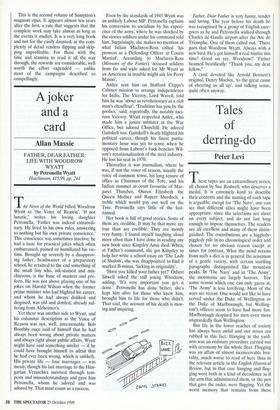A joker and a card
Allan Massie
FATHER, DEAR FATHER: LIFE WITH WOODROW WYATT by Petronella Wyatt Hutchinson, £15.99, pp. 244 The News of the World billed Woodrow Wyatt as 'the Voice of Reason'. 'If not lunatic,' writes his loving daughter Petronella, 'Father was indeed extraordi- nary. He lived to his own rules, answering to nothing but his own private conscience.' This conscience was sometimes inactive; he had a taste for practical jokes which often embarrassed, pained or humiliated his vic- tims. Brought up severely by a disapprov- ing father, headmaster of a preparatory school, he retained to the end something of the small boy who, ink-stained and mis- chievous, is the bane of masters and pre- fects. He was not above playing one of his jokes on Harold Wilson when the former prime minister who had blighted his career, and whom he had always disliked and despised, was old and dottled, already suf- fering from Alzheimer's.
Yet there was another side to Wyatt, and his columnar description as the Voice of Reason was not, well, unreasonable. Bob Boothby once said of himself that he had always been wrong about private matters and always right about public affairs. Wyatt might have said something similar — if he could have brought himself to admit that he had ever been wrong, which is unlikely. His private life — four marriages — was messy, though his last marriage to the Hun- garian Veruschka survived through tem- pests and misunderstandings and gave him Petronella, whom he adored and was adored by. That must count as a success.
Even by the standards of 1945 Wyatt was an unlikely Labour MP. Petronella explains his conversion to socialism by his experi- ence of the army, where he was shocked by the stories soldiers under his command told him. Surprisingly, she makes no mention of what Julian Maclaren-Ross called 'his prowess as a Defending Officer at Courts Martial'. According to Maclaren-Ross (Memoirs of the Forties) 'accused soldiers from far and wide asked for Mr Wyatt as an American in trouble might ask for Perry Mason'.
Attlee sent him on Stafford Cripps's Cabinet mission to arrange independence for India. The Viceroy, Lord Wavell, told him he was 'about as revolutionary as a rich man's chauffeur'. 'Tradition has you by the goalies,' said, reportedly, the notably taci- turn Viceroy. Wyatt respected Attlee, who made him a junior minister at the War Office, but adored Churchill. He adored Gaitskell too. Gaitskell's death blighted his political career, though his finest parlia- mentary hour was yet to come when he opposed from Labour's back-benches Wil- son's renationalisation of the steel industry. He lost his seat in 1970.
Thereafter it was journalism, where he was, if not the voice of reason, usually the voice of common sense, his long tenure of office as Chairman of the Tote, and his Indian summer as court favourite of Mar- garet Thatcher, Queen Elizabeth the Queen Mother and Rupert Murdoch, a treble which would pay out well on the Tote. Petronella says little of the last- named.
Her book is full of good stories. Some of them are credible. It may be that more are true than are credible. They are mostly very funny. I found myself laughing aloud more often than I have done in reading any new book since Kingsley Amis died. When, at Father's command, she got Kingsley to help her write a school essay on 'The Lady of Shalott', she was disappointed to find it marked B-minus, 'lacking in originality'.
'Have you killed your father yet?' Osbert Sitwell asked the still young Woodrow, adding, 'It's very important you get it done.' Petronella has done better; she's kept him alive for those who knew him, brought him to life for those who didn't. That said, the account of his death is mov- ing and inspiring.
Father, Dear Father is very funny, tender and loving. The year before his death he was recognised by a group of English race- goers as he and Petronella walked through Charles de Gaulle airport after the Arc de Triomphe. One of them called out, 'There goes that Woodrow Wyatt. Always with a new bird. He's got himself a real bimbo this time! Good on yer, Woodrow!' Father beamed beatifically: "Thank you, my dear fellow." '
A card: devoted like Arnold Bennett's original, Denry Machin, `to the great cause of cheering us all up', and talking sense, quite often anyway.


















































































 Previous page
Previous page